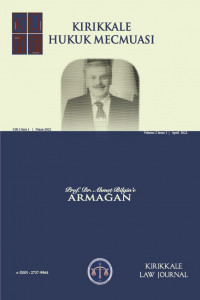Abstract
Çalışma, Osmanlı hukukunda zina hâlinde öldürme konusunu ele almaktadır. Fâilin, kasten öldürme fii-lini, karısını ya da mahreminden bir kadını zina ederken gördüğü esnada işlemesi şeklinde ortaya çıkan bu hu-kukî müessese, doktrinde bazı yazarlar tarafından meşru müdafaanın bir türü olarak görülmüştür. Buradan hareketle, çalışma içerisinde zina suçuna karşı meşru müdafaa kavramının kullanılması tercih edilmiştir. Çalışma ile birlikte zina suçuna karşı meşru müdafaanın Osmanlı hukuku teori ve uygulamasındaki yerinin; fetvalar, kanunnameler, mahkeme kararları gibi birinci el kaynaklardan istifade edilerek açıklanması hedeflenmektedir. Çalışma hem klasik dönem hem de Tanzimat dönemi uygulamasını incelemektedir. Keza çalışmada bölge yö-nünden de bir sınırlamaya gidilmemiş, tüm Osmanlı coğrafyasındaki uygulama ele alınmıştır. Elde edilen sonuç-lar genel itibariyle şöyledir: Klasik dönemde konumuza dair şer’î ve örfî hukuk kaynaklarının birbiriyle uyumlu olduğu, zina suçuna karşı meşru müdafaa kapsamında kalan kasten öldürme fiillerinin hukuka uygun kabul edildiği anlaşılmıştır. Tanzimat döneminin 1858 Ceza Kanunnamesi’nin yürürlüğe girmesinden önceki evresin-de, şer’î mahkemelerle Meclis-i Vâlâ’nın ahenkli kararlar verdikleri, 1858 Ceza Kanunnamesi’nin yürürlüğe girmesi ile birlikte şer’an cezalandırılmayan faillerin kanunname hükmüne göre indirimli cezalar aldıkları görül-müştür. Araştırma ile birlikte ayrıca 1858 Ceza Kanunnamesi’nin konumuzla ilgili düzenleme içeren 188. mad-desinin hazırlanmasında, kısmen yerli kaynaklardan kısmen de Fransız Ceza Kanunu’ndan istifade edildiği sonucuna ulaşılmıştır.
References
- Abdurrahîm Efendi. Fetâvâ-yı Abdürrahîm C:I. İstanbul: 1243.
- Ahmed Lütfi. Mir’at-ı Adalet yahud Tarihçe-i Adliye-i Devlet-i Aliyye. İstanbul: Kitapçı Ohannes, 1304.
- Ahmed Ziya. Mufassal Kanun-ı Ceza ve Teferruatı Şerhi. İstanbul: Cihan Matbaası, 1339.
Abstract
The study deals with the issue of killing in the case of adultery in Ottoman law. This legal institution, which emerged in the form of the perpetrator committing the act of intentionally killing his wife or a private woman while he was committing adultery, has been seen as a type of self-defense by some authors in the doct-rine. From this point of view, it was preferred to use the concept of self-defense against the crime of adultery in the study. With the study, the place of self-defense against the crime of adultery in the theory and practice of Ottoman law; it is aimed to explain by making use of first-hand sources such as fatwas, codes, court decisions. The study examines both the classical period and the Tanzimat period. Likewise, in the study, there was no restriction in terms of region, and the application in the entire Ottoman geography was discussed. The results obtained are generally as follows: In the classical period, it was understood that the religious and customary law sources on our subject were compatible with each other, and the acts of willful killing within the scope of self-defense against the crime of adultery were accepted as lawful. In the phase of the Tanzimat period before the 1858 Penal Code came into force, it was seen that the shari'a courts and the Majlis-i Vala made harmonious decisions, and with the entry into force of the 1858 Penal Code, the perpetrators who were not punished by the law received reduced sentences according to the provision of the law. Along with the research, it was also concluded that in the preparation of Article 188 of the 1858 Penal Code, which contains the regulation on our subject, partly domestic sources and partly the French Penal Code were used.
References
- Abdurrahîm Efendi. Fetâvâ-yı Abdürrahîm C:I. İstanbul: 1243.
- Ahmed Lütfi. Mir’at-ı Adalet yahud Tarihçe-i Adliye-i Devlet-i Aliyye. İstanbul: Kitapçı Ohannes, 1304.
- Ahmed Ziya. Mufassal Kanun-ı Ceza ve Teferruatı Şerhi. İstanbul: Cihan Matbaası, 1339.
Details
| Primary Language | Turkish |
|---|---|
| Subjects | Law in Context |
| Journal Section | Research Article |
| Authors | |
| Publication Date | April 30, 2022 |
| Submission Date | February 26, 2022 |
| Published in Issue | Year 2022 Volume: 2 Issue: 1 |
This work is licensed under Attribution-NonCommercial 4.0 International


